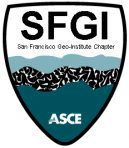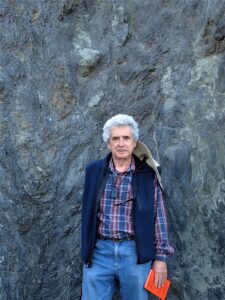
SFGI Past Events
Past Events
For the latest announcements regarding events, dinner meetings, and news, please visit the SFGI LinkedIn Group or sign up for email updates. Check out our main SFGI webpage for upcoming events.
2023
SFGI Panel Discussion
Geotechnical Engineering through the Pandemic
March 23, 2023
San Francisco Geo-Institute (SFGI) hosted a virtual panel discussion via Zoom to collectively reflect upon the impact of the COVID-19 pandemic on the ground engineering community. The panel provided insight from a diverse set of perspectives and backgrounds spanning academicians, consultants, public agencies and contractors.
Panelists

Bernard Catalano is the Tunneling Business Development Manager (North America) for Bessac. He has over 25 years of experience in Tunnel Boring Machine (TBM) tunneling, well-versed in management, control, supervision, development, design, planning and construction of large tunnel construction projects across the globe.
2022
Association of Environmental & Engineering Geologists
San Francisco Bay Area Chapter &
San Francisco Geo-Institute
Tuesday, October 11, 2022
 >Dimitrios Zekkos, PhD, PE
>Dimitrios Zekkos, PhD, PE
Professor, Department of Civil and Environmental Engineering
UC Berkeley
Development of Regional Co-seismic Landslide Inventories and Predictive Models: The Example of the 2015 Lefkada, Greece, Earthquake
SFGI & AEG Field Trip
Saturday, August 20th, 2022
Speaker: Nik Sokol
Topic: “Rock Slope Hazard Mitigation in San Francisco”
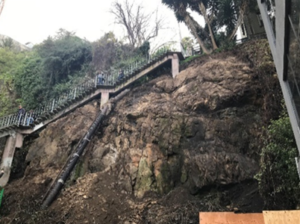
Agenda:
0915 – 0930: Meet at bottom of Filbert Steps. Cross Streets are Sansome Street and Filbert Street
0900-1200: Tour of San Francisco Geology, led by Nik.
Field Trip followed by happy hour!
Happy Hour!
Thursday, June 23rd, 2022

40th Annual Geosystems Engineering Distinguished Lecture Series
Registration Options that include Dinner are Closed!
May 13, 2022
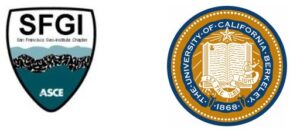 “Evaluating the Effects of Liquefaction”
“Evaluating the Effects of Liquefaction”
2022 H.B. Seed lecture
Prof. Jonathan Bray, UC Berkeley
“Multi-physics repetitive loads-Natural and Engineered Systems”
Prof. J. Carlos Santamarina, KAUST
“Nonlinear viscoplastic modeling of the Feijão Dam 1 failure”
Prof. Ross Boulanger, UC Davis
Joint AEG/SFGI Meeting
Dr. Edmund Medley, PE, PG, CEG, D.GE, F. ASCE
Principal Consultant at Terraphase Engineering
“Suggestions for Prudent Geopractice with Franciscan Bimrocks”
Tuesday, March 8th, 2022
2021
JOINT AEG/SFGI MEETING
2020-2021 JAHNS DISTINGUISHED LECTURER
Cheryl Hapke, PhD
Integral Consulting and University of South Florida – St. Petersburg
“When Mountains Move Roads: Science, Engineering, and Management
along the Big Sur Coast”
Along the Big Sur coastline in central California, the Coast Range descends steeply into the Pacific Ocean, creating one of the most extreme coastal slopes in the coterminous United States. Weak rocks and steep topography provide ideal conditions for frequent large landslides that potentially contribute a substantial portion of material to the littoral sediment budget. Little was known about the sediment budget in this area, including the amount, rate and frequency of sediment input to the system from coastal landslides. Adjacent to the Big Sur coastline is the Monterey Bay National Marine Sanctuary (MBNMS), a protected area of coastal waters and home to a variety of aquatic species.
The California Department of Transportation (Caltrans) needed solutions to the difficulties they face with keeping slide-prone coastal Highway 1 open and safe while minimizing impacts to the MBNMS below the road. As a contribution to developing a highway management plan, and in order to advance the fundamental understanding of landslide and coastal processes along this stretch of coastline, a technique was developed to quantify the historical volume of sediment that enters the littoral system from coastal slope failures.
The technique uses aerial photography and digital photogrammetry to produce 3-dimensional stereo models from which digital terrain models (DTMs) are extracted. The sediment yield varies significantly along the coastline, from as low as 1,000 m3/km/yr to nearly 47,000 m3/km/yr. This variation is largely attributed to differing lithologies of the slope forming materials.
Dr. Cheryl Hapke is a coastal geologist with more than 25 years of experience studying coastal evolution and coastal change processes in a variety of geomorphic settings. Dr. Hapke worked for several decades with the U.S. Geological Survey as a research scientist, and now is a senior consultant in coastal resiliency with Integral Consulting. She also has an appointment as a research professor at the University of South Florida, College of Marine Science. Her current research focuses on coastal vulnerability and sea-level rise adaptation, developing new tools and approaches to evolve the science of coastal hazards. She has authored over 80 peer-reviewed papers, book chapters, and technical reports, and served as a subject matter expert on coastal change hazards to local, state, and federal agencies, and international groups.
VIRTUAL SPECIAL SPEAKER
Professor Timothy D. Stark
Civil and Environmental Engineering
University of Illinois at Urbana-Champaign
Housing Development Case History near San Francisco –
Fill Placement on Franciscan Mélange
A recording of the webinar and the related files are located in this Google Drive folder.
Observations, testing, data, and analyses used to investigate the cause of distress into two housing developments located downslope of a large hillside fill will be presented. The investigation shows the distress in the housing developments was caused by a large and deep bedrock slope failure triggered by the hillside fill placement. In particular, large diameter borings, torsional ring shear testing on the fine-grained portion of the mélange, the complex geologic setting, and the effects of rainfall, surficial grading, home construction, and fill placement on slope stability will be discussed. Finally, the presentation will present eight (8) project management lessons from this important case history.
39th Annual Geosystems Engineering Distinguished Lecture Series
SFGI ASCE and UC Berkeley presented the 39th Annual Geosystems Engineering Distinguished Lecture Series. This year’s event took place online on May 7th and featured the following three lectures and a panel discussion:
Prof. Laurie Baise from Tufts University: “Observations and Characterization of Complexity in Site Response”
Prof. Dimitrios Zekkos from UC Berkeley: “Integrated Satellite, UAV and ground-based assessment of landslides: The 2015 M 6.5 Lefkada earthquake in Greece”
Prof. Thomas O’Rourke from Cornell University: “The Next Generation Hazard Resilient Infrastructure”
Following the lectures, we had a panel discussion on “Emerging technologies and opportunities on moving from site-specific to regional analyses and assessment”.
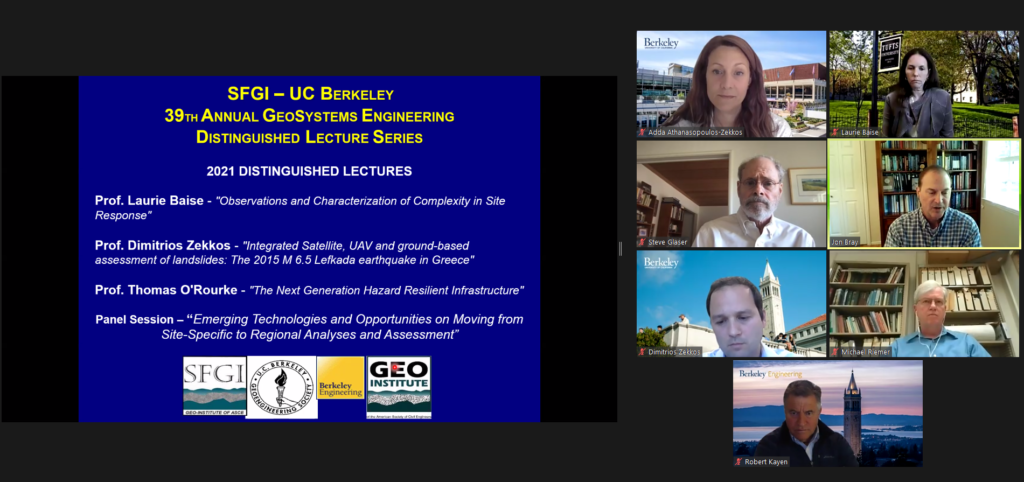
GEOTECHNICAL DIVERSITY PANEL
SFGI hosted a virtual Geotechnical Diversity Panel via Zoom on April 20, 2021. The panel provided insight from a wide range of engineers with diverse backgrounds and from a range of different sectors of the geotechnical engineering industry. These panelist included Adda Athanasopoulous-Zekkos, Ph.D.; Elizabeth Bialek, P.E.; Meredith Long, P.E.; Michelle Shriro, Ph.D., P.E., G.E.; and Ramin Golesorkhi, Ph.D., P.E., G.E. Thank you to the panelists and participants for the engaging discussion!
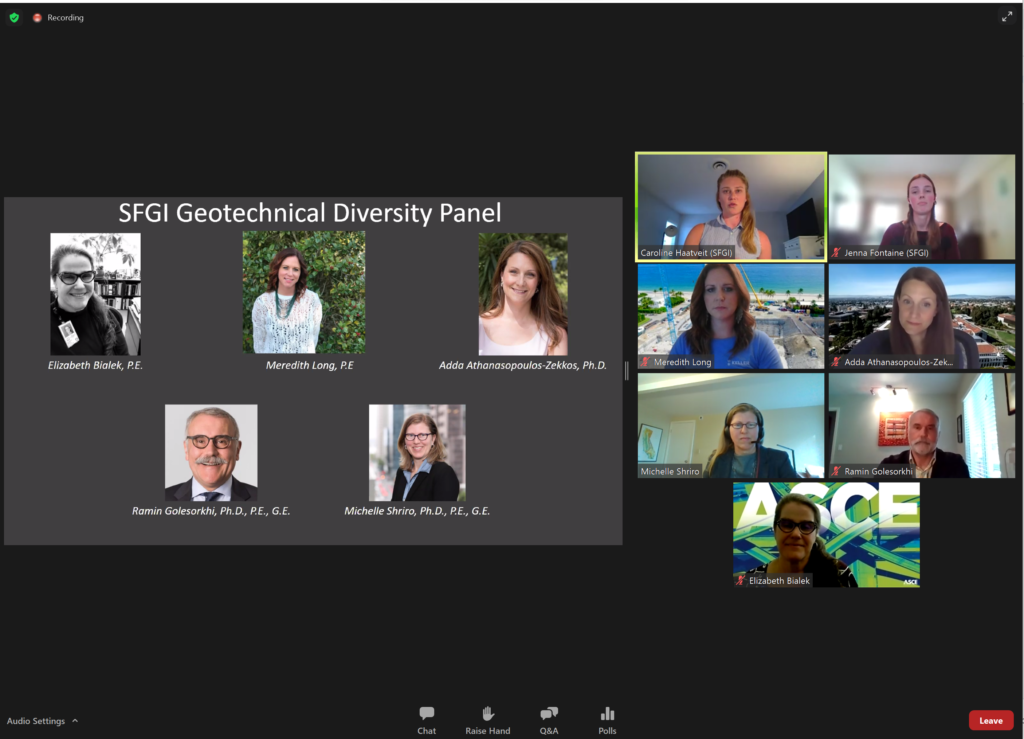
GEOTECHNICAL INSTRUMENTATION AND MONITORING WORKSHOP
SFGI hosted a virtual Instrumentation and Monitoring Workshop via Zoom. The workshop was held across two sessions delivered in February 2021. The two-part workshop was intended to present perspectives from both academia and industry, with the first session delivered by Kenichi Soga (UC Berkeley) and the second session delivered by Paul Thurlow (Geo-Instruments). Workshop attendees were provided an overview of geotechnical instrumentation and monitoring techniques and case histories demonstrating the implementation of these techniques. Thank you both to our speakers, Kenichi Soga and Paul Thurlow!

